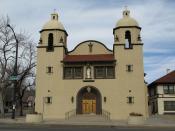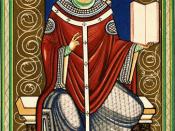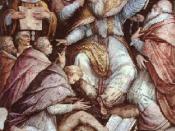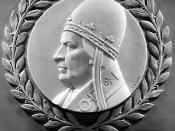The Inquisition In the Early Middle Ages, as the Church was at a peak on its power heretics were seen as society's biggest enemy. The crime of heresy was defined as a deliberate denial of an article of truth of the Catholic faith, and a public and obstinate persistence in that alleged error. Pope Gregory IX instituted the papal inquisition in 1231. The name Inquisition is derived from the Latin verb inquiro (inquire into). The Inquisition was started to combat the heretical Cathari and Waldenses, it later went on to include witches, diviners, blasphemers, and other sacrilegious persons.
One of Pope Gregory's reasons for the creation of the Inquisition was to bring about order and legality to the process of dealing with heresy. At times many towns people would burn a suspect without so much as a trial. Pope Gregory's original intent for the Inquisition was a court of exception to inquire about the beliefs of those differing from the Church's teaching and to instruct them in orthodox doctrine.
It was then hoped that heretics would see the error of their opinion and would return to the Roman Catholic Church. If they did not see eye to eye with the Church suspects would then be handed over to civil authorities. They in turn would use their own brands of punishment for civil disobedience. Some of the forms of torture included being burnt at the stake, being hung , having a towel put in your mouth and having water poured on it so that you would choke to death, and being laid out on a table and having ropes tied to your wrists and ankles and being pulled in opposite directions.
I believe the Inquisitions to be brutal and horrid times in the Church's history.
I think a lot of what the Catholic Church was doing was wrong and was known to be wrong by them. I also do not think the Inquisitions were necssary. If people have different beliefs they should not be put to death for them. This is something even today that certain Catholics in other lands still have yet to learn.





